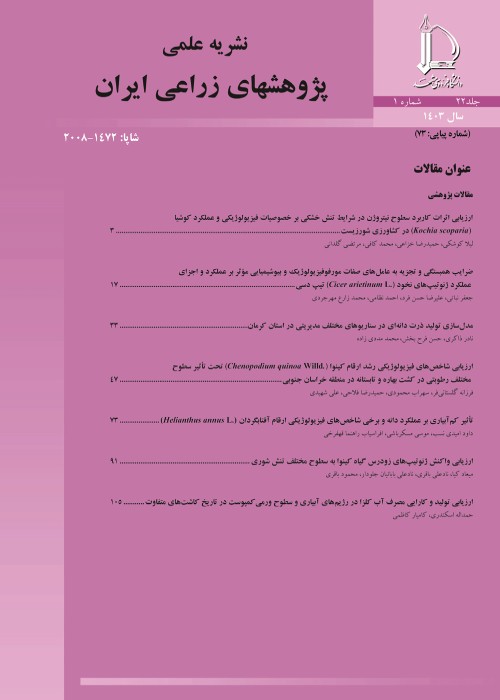Effect of Iron and Zinc Nano Chelates on Yield and Yield Components of Black Cumin Medicinal Plant (Nigella sativa L.)
The black seed is scientifically known as Nigella sativa L. from the family Ranunculaceae, which is susceptible to deficiencies in micro elements, including iron and poor soils. The concentration of Fe and Zn in soil solution is usually very low and is mostly mixed with organic matter. The solubility of Zn and Fe is strongly dependent on soil acidity. Managing nutrient intake can improve plant growth and product quality. Inappropriate nutrient management in today's common practice results in degraded agricultural ecosystems and endangered human health, and these problems have necessitated rethinking ways to increase crop production. Rezaei et al. (2016) reported increasing yield traits in stevia plant through using nano iron and zinc and manganese solution. Foliar application of micronutrients can improve grain and oil yield by improving yield components. In the present study, the effect of iron and zinc nanoparticle foliar application on morphophysiological and phytochemical changes of black seed has been evaluated.
The experiment was carried out as a factorial experiment based on a randomized complete block design with three replications in the research field of Gonbade-Kavous University of Agriculture and Natural Resources University of Tarbiat Modares University in 2018-2019. Experimental treatments included control (no foliar application), iron nutrient (iron nano chelates at 1.5 and 4 in a thousand + 3 iron per thousand chelate) and zinc nutrient (zinc nano chelate at 1.5 and 3 in a thousand) and chelate (3 in a thousand) which was used as foliar application. Treatments were applied at 8-10 leaf stage and at the time of capsule filling. The experimental plots were two meters wide with four rows of 50 cm and the length of each plot was 6 m. There was a distance of one meter between each trial unit and a distance of 2 meters between each block. Midlines were used for sampling. Data were analyzed using SAS ver 9.3 statistical software and LSD test was performed at 5% level.
The results showed that the studied traits such as plant height, number of lateral branch, number of pods per plant, number of seed per pods, seed weight per pods, capsule diameter, 1000-seedweight, yield seed, biologicalyield and harvestindex were affected by main effects and interactions of the treatment compounds in Tehran and Goonbade-Kavus fields. Application of iron and zinc chelates in the form of nano-chelates had the highest effect on yield and yield components of the black-seeded medicinal plant in comparison to the chelate form. Maximum grain yield (217.44 g.m-2 in Goonbade-kavus and 288.66 g.m-2 in Tehran), biological yield (582 g.m-2 in Goonbade-kavus and 352.93 g.m-2 in Tehran) and harvest index (37.43% in Goonbade-kavus and 76.467% in Tehran) were observed in the nano-treatment of iron chelate 4 per thousand and the lowest value of seedyield (25.2 g.m-2 in Goonbade-kavus and 20.05 g.m-2 in Tehran), biological yield (260.67 g.m-2 in Goonbade-kavus and 130.67 g.m-2 in Tehran) and harvest index (25.2% in Goonbade-kavus and 11.81% in Tehran) were observed in iron and zinc chelates.
Based on the results obtained and considering the different measured properties, the application of iron and zinc in the form of nano will have a positive effect on the quantitative performance of black seed. given the role of micronutrients in some enzymes and their effective role in protein synthesis, this increase in yield can be justified compared to control.
- حق عضویت دریافتی صرف حمایت از نشریات عضو و نگهداری، تکمیل و توسعه مگیران میشود.
- پرداخت حق اشتراک و دانلود مقالات اجازه بازنشر آن در سایر رسانههای چاپی و دیجیتال را به کاربر نمیدهد.


